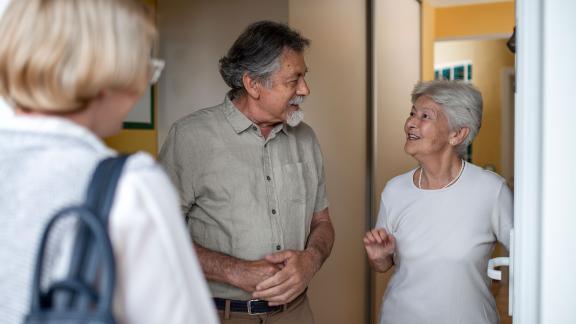NHS Reset: Ensuring people living with dementia do not pay a greater price for the pandemic

NHS Reset is an NHS Confederation campaign to help shape what the health and care system should look like in the aftermath of the pandemic. In this blog, Karin Orman from the Royal College of Occupational Therapists calls for national approach to rehabilitation to supporting people living with dementia through the COVID-19 pandemic and beyond.
Today is World Alzheimer’s Day. In the ‘old normal’, today would offer the opportunity to raise awareness of dementia, fundraise for charities and highlight the inequalities within services for people living with dementia.
But with COVID-19, the focus this year must surely be on the devastating impact on people living with dementia. To that end, the Royal College of Occupational Therapists (RCOT) is joining forces with Alzheimer’s Society to use the spotlight of World Alzheimer’s Day to call for a national rehabilitation strategy that is inclusive of people living with dementia. We aim to ensure they do not pay a greater price for the current pandemic than the rest of society.
The media has understandably focused on the isolation of people in care homes and the number of deaths, but many people living with dementia have seen their physical and mental state deteriorate at an alarming rate during lockdown. The impact has been huge, with increased sedentary behaviour and associated outcomes of deconditioning, balance deficits, increased risk of falls and deteriorating mental health. The loss of day-to-day cues that occupations, routines and familiar people bring has impacted on people’s function and their ability to retain skills.
The case for a national strategy
As we face a potential second wave and winter pressures hit services, we need to ensure that the 850,000 people living with dementia and their families are protected from further loss of quality of life, as well as actual loss of life.
Many occupational therapists, alongside other allied health professionals, were deployed to acute services at the start of the pandemic, with community services primarily offering virtual support, and access to care homes denied. Going forward, these decisions about workforce should take into account the cost to vulnerable groups on reducing community-based services and in particular access to rehabilitation and non-medical interventions.
The RCOT and Alzheimer’s Society are therefore calling on government to address this to help avoid drastically reduced quality of life for people living with dementia, as well as future deaths. We propose a national approach to rehabilitation that recognises the different levels of need by different population groups:
- people recovering from COVID
- people shielding
- people recently diagnosed with dementia
- and people living in care homes.
A failure to deliver effective rehabilitation to those deconditioned or otherwise in need risks worse outcomes for those who become unwell with COVID-19 in future pandemic waves.
Addressing different levels of need
People recovering from COVID. The Royal College of General Practitioners has rightly raised concerns about ‘long COVID’, when people who have had the virus experience ongoing symptoms, such as chronic fatigue. RCOT has been involved in the development of resources for Your COVID Recovery but more tailored interventions are needed for people with dementia. For people living with dementia who may not be able to understand or communicate their symptoms, carers and family members may require help to recognise possible ‘long COVID’ and GPs need to know what services are available locally.
People living with dementia and shielding. There should be proactive identification of people who require rehabilitation as a result of shielding, including people who are frail or living with a range of health conditions. This could be supported by further roll out of multidisciplinary teams in primary care with occupational therapists, for example, offering screening, advice and referral onto rehabilitation services. Closer links between community rehabilitation and memory or dementia services would ensure that people with dementia are not excluded.
People newly diagnosed with dementia benefit from adopting strategies and techniques to maintain independence. We can’t afford for these groups or sessions to be further interrupted, as they offer the opportunity for people to continue to manage their daily routine and retain their identity and roles for as long as possible.
People living in care homes. Care home staff need support and time to access expert advice on how they can adapt activities, the care home environment, their approach to support people with dementia, and reduce the distress that results in behaviours carers find difficult to manage. Community mental health teams and care home liaison teams are part of the rehabilitation offer and the skills mix and expertise within the teams should reflect this.
Can we afford to do this now?
COVID-19 spikes or waves will be having an impact on service delivery and society for the foreseeable future. Investing in our frontline response is the priority, but lack of planning around rehabilitation will only result in further pressure points across the system and people living with dementia experiencing greater inequalities in health. Local providers and health and care systems understand their population needs but with the current multiple pressures can we afford to wait for local solutions to spring up? A rehabilitation strategy would provide a steer to consider what is needed.
RCOT and Alzheimer’s Society would welcome hearing about any service innovations in rehabilitation for people with dementia. Please contact either Benjamin Powick, policy and public affairs manager (Benjamin.powick@rcot.co.uk) or Ella Robinson, senior policy advisor at Alzheimer’s Society (ella.robinson@alzheimers.org.uk)
Karin Orman is director of policy and professional practice at the Royal College of Occupational Therapists. Follow the college and Alzheimer’s Society on Twitter @theRCOT and @alzheimerssoc



